I'm breaking from the norm of talking about Kenya to give some love to my US residence...or at least to a small section of my town where I don't actually live. Those of you who know can vouch for its accuracy.
Coming soon: update on my weekend adventures in TanZANia.
Sunday, June 28, 2009
Friday, June 26, 2009
Let's talk about food...
It's one of my favorite subjects.
Given my level of interest, I figured maybe everyone else likes it as much as I do, and thus you'd like to be enlightened on my food situation in Kenya. Here are the kinds of things that have made their acquaintance with my palette:
Beans and rice. A classic. And when I get it for lunch, it costs me about 60 shillings. That's less than a dollar, and it's usually more than I can eat in one sitting. Sometimes I splurge and get beans with a hint of coconut flavor. Aw yeah.
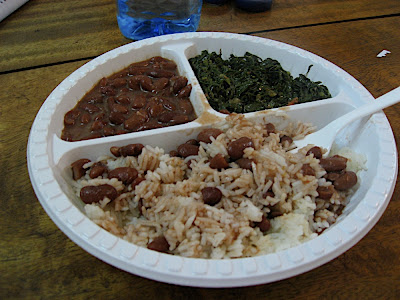
Also pictured is muchicha, one form of greens I've had here. Kind of like kale. It's a little bitter, and it bears a strong resemblance to seaweed. Although I have to confess, it looks and tastes exactly like every other form of greens I've eaten. They're all cooked down the same way wherever I go and whatever I get, and if I ask what's in it, they'll tell me, "African vegetables." Awesome. The one you see in the next pic is sukumo. Notice any difference? Yeah, I couldn't, either.
This is githeri. A slight variation. This time, the beans are accompanied by corn (these grains tend to be a little tougher than you may typically be accustomed to), and a little cabbage. I swear, the first time I tried it, I was reminded of the flavor of Shepherd's Pie. I can't say I've had that impression again since the first time, but there you have it.

Ugali. Kenyans go nuts over this dish. They eat it all the time and crave it when they don't. To those of us who are accustomed to food that isn't very, very bland, this may come as a surprise. It's basically just cornmeal. It's kind of like mashed potatoes, only thick enough to hold its form. You'd never eat it alone - it usually would accompany the greens or some meat.

If ugali doesn't provide enough flavor for you, you may consider trying mukimo, another traditional dish. They mash together beans, corn, potatoes and greens. The whole time I was eating it, all I could think of was Green Eggs and Ham. I just may try to recreate mukimo next St. Patrick's Day. In this picture, it's the green stuff that doesn't look like the greens I've already shown you.

Chapati. Think tortillas. No, wait. Think nan. Eh...it's something in the middle. It's like a thick tortilla that is fried. Like lots of things I'm mentioning, it tends to accompany a more flavorful dish, like beans or the beef stew I tried on my first day.
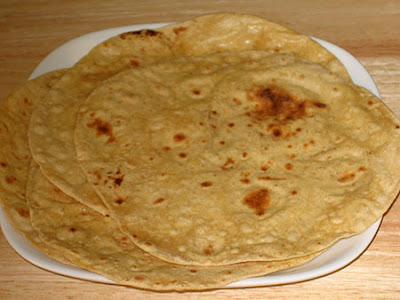
Pilau rice is also a favorite around here, and it's eaten with beef stew. But unlike the other favorites, this one's got plenty of flavor. The rice kind of tastes Middle-Eastern. The closest flavor I could compare it to would be the rice I get at Kabob Palace (Afghan food) in Crystal City. The resemblance is striking.
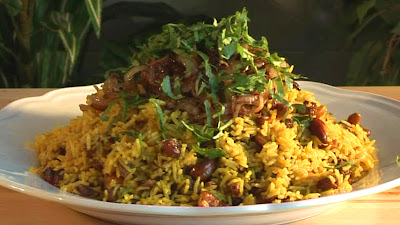
Other than that, there are lots of mangos, bananas, mangos, passion fruit, mangos, and other fruit that is extra-sweet and crazy delicious. As is the yogurt, and the juice. I am helplessly hooked. Hopefully once I get back to the US, I won't have a hard time adjusting back to fruit that wasn't picked earlier that same morning.

Kenyans are serious about their food combinations. If you're getting multiple items, you'd better make sure they match. If it's not an acceptable combination, don't worry. They'll let you know. Let's say you tried to order some mukimo and sukumo. They will tell you flat-out that this is a bad idea, and then they'll offer alternatives, and then they'll walk away to go fill your order that they determined you actually wanted.
And just for fun, I'll show you a couple things you may see from vendors on the streets of Mombasa...not like I've tried any of it, because I don't buy food from street vendors.
Cassava. Think yuca. Here, they'll fry them like potato chips in these big, black, wok-looking things...

...or they'll fry them like french fries (which everyone here calls "chips").

And the coconut. I confess. I've gotten this off the street lots of times. I think I've already mentioned this delicacy before. They take a not-yet-mature coconut, hack off the top with a machete, and let you drink the coconut juice inside. When you're done, they make a spoon for you out of the coconut shell and then you get to eat the coconut meat. It's bliss.

Cooking conditions at my house aren't exactly optimal. We haven't ended up cooking much at all because it's just such a large-scale production. First of all, we just don't have many options at the grocery store. Second, we have a hot plate and a microwave, and nothing else. Finally, after the meal we have to boil water to wash the dishes, then wait for it to get cool enough to touch. By this time, it's getting late, and we've just lost the ganas to get it all done. Add all that to the end of a long day of working in a hot office, and together it equals minimal cooking and dinners that are less than balanced.
So Bekah DC and I have a plan. We order just a little more than we typically do at lunch, and we take all the leftovers home, and voila! We eat lunch and dinner until we are filled, typically for less than $2 a day. Step two was to invest in some paper plates and plasticware, and we successfully eliminated the washing of dishes. Granted, we don't have so much variety, but we get to be healthy and lazy, at a fraction of the cost! It's win-win-win!
Given my level of interest, I figured maybe everyone else likes it as much as I do, and thus you'd like to be enlightened on my food situation in Kenya. Here are the kinds of things that have made their acquaintance with my palette:
Beans and rice. A classic. And when I get it for lunch, it costs me about 60 shillings. That's less than a dollar, and it's usually more than I can eat in one sitting. Sometimes I splurge and get beans with a hint of coconut flavor. Aw yeah.
Also pictured is muchicha, one form of greens I've had here. Kind of like kale. It's a little bitter, and it bears a strong resemblance to seaweed. Although I have to confess, it looks and tastes exactly like every other form of greens I've eaten. They're all cooked down the same way wherever I go and whatever I get, and if I ask what's in it, they'll tell me, "African vegetables." Awesome. The one you see in the next pic is sukumo. Notice any difference? Yeah, I couldn't, either.
This is githeri. A slight variation. This time, the beans are accompanied by corn (these grains tend to be a little tougher than you may typically be accustomed to), and a little cabbage. I swear, the first time I tried it, I was reminded of the flavor of Shepherd's Pie. I can't say I've had that impression again since the first time, but there you have it.
Ugali. Kenyans go nuts over this dish. They eat it all the time and crave it when they don't. To those of us who are accustomed to food that isn't very, very bland, this may come as a surprise. It's basically just cornmeal. It's kind of like mashed potatoes, only thick enough to hold its form. You'd never eat it alone - it usually would accompany the greens or some meat.

If ugali doesn't provide enough flavor for you, you may consider trying mukimo, another traditional dish. They mash together beans, corn, potatoes and greens. The whole time I was eating it, all I could think of was Green Eggs and Ham. I just may try to recreate mukimo next St. Patrick's Day. In this picture, it's the green stuff that doesn't look like the greens I've already shown you.

Chapati. Think tortillas. No, wait. Think nan. Eh...it's something in the middle. It's like a thick tortilla that is fried. Like lots of things I'm mentioning, it tends to accompany a more flavorful dish, like beans or the beef stew I tried on my first day.

Pilau rice is also a favorite around here, and it's eaten with beef stew. But unlike the other favorites, this one's got plenty of flavor. The rice kind of tastes Middle-Eastern. The closest flavor I could compare it to would be the rice I get at Kabob Palace (Afghan food) in Crystal City. The resemblance is striking.

Other than that, there are lots of mangos, bananas, mangos, passion fruit, mangos, and other fruit that is extra-sweet and crazy delicious. As is the yogurt, and the juice. I am helplessly hooked. Hopefully once I get back to the US, I won't have a hard time adjusting back to fruit that wasn't picked earlier that same morning.

Kenyans are serious about their food combinations. If you're getting multiple items, you'd better make sure they match. If it's not an acceptable combination, don't worry. They'll let you know. Let's say you tried to order some mukimo and sukumo. They will tell you flat-out that this is a bad idea, and then they'll offer alternatives, and then they'll walk away to go fill your order that they determined you actually wanted.
And just for fun, I'll show you a couple things you may see from vendors on the streets of Mombasa...not like I've tried any of it, because I don't buy food from street vendors.
Cassava. Think yuca. Here, they'll fry them like potato chips in these big, black, wok-looking things...

...or they'll fry them like french fries (which everyone here calls "chips").

And the coconut. I confess. I've gotten this off the street lots of times. I think I've already mentioned this delicacy before. They take a not-yet-mature coconut, hack off the top with a machete, and let you drink the coconut juice inside. When you're done, they make a spoon for you out of the coconut shell and then you get to eat the coconut meat. It's bliss.

Cooking conditions at my house aren't exactly optimal. We haven't ended up cooking much at all because it's just such a large-scale production. First of all, we just don't have many options at the grocery store. Second, we have a hot plate and a microwave, and nothing else. Finally, after the meal we have to boil water to wash the dishes, then wait for it to get cool enough to touch. By this time, it's getting late, and we've just lost the ganas to get it all done. Add all that to the end of a long day of working in a hot office, and together it equals minimal cooking and dinners that are less than balanced.
So Bekah DC and I have a plan. We order just a little more than we typically do at lunch, and we take all the leftovers home, and voila! We eat lunch and dinner until we are filled, typically for less than $2 a day. Step two was to invest in some paper plates and plasticware, and we successfully eliminated the washing of dishes. Granted, we don't have so much variety, but we get to be healthy and lazy, at a fraction of the cost! It's win-win-win!
Sunday, June 21, 2009
Ninataka shani!
This past week was kind of a turning point. On the work front, I've gotten to the point that I'm comfortable with what I'm doing, I'm friends with my colleagues, I've made some great progress on the projects I'm working on, and I've established some much-needed boundaries (mentally and otherwise) on expectations. On the non-work front, I realized that I've reached the point where the strange things feel normal, I am oriented to the city, I know the matatu routes, I've picked up the essentials with the Swahili, and I'm feeling lighthearted and comfortable with my surroundings. I've reached equilibrium and my confidence has been restored to its optimum level.
Basically, I found my groove.
I really am happy with the work I've been able to do so far out here. Earlier this week, I showed Omar the templates I've been working on that he can use to automatically generate reports for all of the different levels of the organization. In the long term, I'm envisioning this to be a tool that benefits everyone because it's just going to mean faster access to data that is easy to read and use. In turn, this means more loans for more people. In the short run, it's all about making Omar's life easier. And if that's the only result I get to see while I'm here, that's enough for me. He's been a definite bright spot in my time here, even though I'm pretty sure he's been more stressed out than I ever have. Anyway, when I showed him the templates, he LOVED them. I think I can confidently use the term "gleeful" to describe his reaction.
The running joke has become that he increases my dowry every time I show him my latest time-saving implementation. So far, I'm up to a cow and two elephants.
I got to visit some villages this week, with Bekah UT and some CHOICE people. We were going to do interviews with people from villages where they were building latrines or digging wells, to put on their website and get the word out about what they're doing. I got a taste of just how difficult it can be to make things happen here. Nobody has a watch, or a calendar, or a phone, and forget about email. So you basically just drive the two or so hours into the bush, and you hope that they're there when you show up. If not, you may have to drive around trying to find them, or you may have to just move on to the next thing. Working at the grassroots level with these rural villages is more work than they get credit for.
Most of the kids were afraid of us, but in one village they were extra-excited to see us when we rolled up. So of course, I rewarded them by taking lots of pictures (and letting them take pictures) to entertain them while the CHOICE people did their thing. They loved it, and I...well, you can see what a blast I was having. Each time we snapped a photo, everyone would huddle around to look at it, then they would all squeal with delight. Two of the little girls started holding my hands, and one of them kept looking up at me, deep into my eyes, and then she'd begin spouting Swahili. Never have I wanted to be fluent in Swahili more than at that moment.
This weekend was full again. We took a trip to Shimba Hills Nature Reserve, and since we're technically living here, we got to pay the resident rate ( = significant savings) to get in. With our trusty park ranger guide, Frederick, and his trusty shotgun in tow, we explored the reserve in style.
We got to see lots of animals...
...and we got to hike to a waterfall and explore around it.
None of these animals have been artificially placed on the reserve, and I love that about Kenya. What you see is the real deal. We decided that Kenya's new motto should be "Kenya keeps it real!"
We also took a boat ride to Kisite Island (just a few miles off the coast of Kenya/Tanzania) to do some snorkeling. I don't recall ever seeing live coral before, but if I have, it was nothing like what I got to see that day. It was just so vibrant and colorful and alive. After that, we opened the sail of our old-school boat and sailed all the way back to the marina. I didn't bring my camera for this leg of the journey, but others did. I'll add some pictures in once I get them. Instead, I got to fully live in the moment and enjoy the incredible, peaceful wonderfulness that is sailing on a ruddy sailboat with our Kenyan crew. Here’s a snippet of the conversation Bekah DC and I had during our sail:
“Hey, remember that one time we went sailing off the coast of Kenya on an African sailboat?”
“At sunset?”
“Right after we went snorkeling?”
“When the temperature and breeze were perfect?”
“Yeah, that was fun.”
Relief Society this week was all about disease prevention. Nothing too crazy this time, but I was really impressed with the knowledge and understanding all of the women had about how to treat/prevent the diseases in this area. We talked about the major diseases that can be found around Mombasa - and how to stay away from them.
I don't know how all the local ladies were feeling at the end, but us mzungus had turned into a bunch of hypochondriacs. We all were feeling like we wanted to rush home and disinfect and sanitize every inch of our apartment that surely must have been suffering from major infestations and diseases. We found a cockroach the other night - the first bug to show its face in our flat apart from the usual flies and mosquitos. (No sightings since then, but speaking of cockroaches - have any of you heard about this???) But the disease-ridden flies! And mosquitos! What if we have bedbugs?! Did we leave this fruit out too long?! Can we bathe in our water?! Or wash our clothes?! (Oh wait, our water wasn't running that day. Well, no problems there! But yes, if you're wondering, we can.)
We've calmed down a little bit since then. Well, most of us have. Basically, I know I'm doing what I can to be cautious, and outside of that, I refuse to live in fear. I can actually feel the security blanket of prayers on my behalf, and there's power in that. My halfway point is tomorrow - I've got one month left here, and it’s going to be a great one.
P.S. I've gotten multiple requests for things to bring back from here...and I've forgotten every last one of them (except a magnet for grandma!). Could you please refresh my memory? You know who you are. :o)
Saturday, June 20, 2009
Sunday, June 14, 2009
Karibuni!
I'm starting to get the hang of some of the key Swahili phrases now. Karibou (car-ee-boo) means "welcome." You hear that a lot here, because Kenyans are just so nice. Another one I've learned is "kwa heri," which means goodbye. Every time I hear it, I think of Chris Farley on that Japanese game show on SNL saying, "kwa-kee-sir-pee-nee-koo!" Whatever works to jog your memory, right?"
So I guess I haven't given much of an update lately...a house tour probably doesn't cut it, eh? Let's see what I can do about that... (Disclaimer: this will be more word-heavy than usual. But don't worry, I'll include slide shows.)
I mentioned that I was sharing a room with Bekah from Utah. That didn't actually last, but I feel like it accomplished what it needed to: now we're friends and we hang out. She doesn't live too far away, so we still meet in the mornings and run to the beach to watch the sun come up, and we'll go dancing or out to get cake. Or juice. (Turns out juice in Kenya is amazing. No matter what kind you get. I just got avocado juice the other day. Loved.) She directed me to a shop that sews skirts out of kangas, and she introduced me to the delights of drinking the juice out of a not-yet-mature coconut and then eating the meat with a spoon made out of a piece of the coconut shell. Yeah, I like Bekah from Utah.
I also like Bekah from DC, who I've been indirectly connected to from a lot of different sources prior to this, we've just never really connected ourselves. Apparently we needed to go to Kenya to be friends. That's okay by me. She just came out this week and is set on experiencing Kenya as much as possible for the 5 weeks she's here. So things have been busy since she arrived, but in a good way.
Our last roommate is Nicole from Mexico City. Such an interesting story she has! Her mom is 100% Spanish and her dad is 100% French, and she speaks English so she's fully conversant in all three languages. She also plays soccer on the club team at her school, and we got a chance to see her mad skills with a bunch of kids in the street today.
We've actually gotten to have a lot of conversations with her about the church because it just naturally comes up all the time. She grew up "Catholic" and has been very curious about Mormons because she's surrounded by us but she just doesn't know anything about us. She was very surprised to learn there were Mormons in Mexico City, because she's just never met any. One night she turned to me and said, "So tell me about your church." Everyone but me has served a mission, so she's basically gotten the first discussion and then some, depending on whatever questions she asks. Her interest seems purely academic, but it's always nice for people to have a good, solid source for this kind of information.
Work has been interesting. I've been learning a lot about what it's like to be a non-profit company that is still trying to grow and be self-sufficient. Yehu has made incredible progress over the past couple years. There is just still so much to be done, but who will do the work? The corporate staff is all stretched so thin. They work long days and come in on the weekends. (Although you would never know when you talk to them - they are all so kind and I've seen no outward displays of any kind of stress that they're all no doubt feeling.) Yehu needs more employees who are qualified, but they just can't afford to pay the kind of salary that would attract said employees. And at the same time, they've got some heavily aggressive expansion plans over the next couple years. Who is going to market this to new potential clients, and who is going to accommodate these new clients when everyone is already so busy?
Yehu is definitely making the most of having access to educated, free labor. I've been keeping very busy with working on my own projects, and with helping the stats guy, Omar, to get caught up. One of the big things I'm focusing on here is making processes more efficient - using shortcuts where they're available, eliminating steps that aren't necessary, and so on. I'm learning that the corporate office may have some inefficiencies, but the biggest problem is in getting those in branches out in the bush to use technology. They have the tools, they're just hesitant to use them. I'm hoping to make it out to some villages to do a little training with these people, to help them to get more comfortable with what they have.
Enough about work. Let's talk about the weekend.
I took Bekah DC and Nicole to the beach. On our way back, we met a guy in a wheelchair named Anthony who has led a fascinating life. He's done multiple marathons in his wheelchair, including in the Olympics (his fastest time was 1:51). He's also done a triathlon, and he knows how to kite surf and he coaches other people on how to do it (they call him Mr. Wind). He offered to teach us, and I may take him up on it. He also has a brother who works for Tsavo West National Park, which just so happens to be where we were hoping to go on a safari in a couple weeks. He says he'll hook us up with some sweet deals. Awesome.
We also visited Mamba Village, a crocodile farm (mamba means crocodile). Lots and LOTS of crocs there. As it turns out, they raise them there and everyone can come see the live crocodiles during all sorts of phases of life, but they also sell croc-skin purses and shoes, and you can eat the meat. Kinda creepy, since we just bonded with the live ones. (But yes, I ate the meat. It was delicious.) They also have a botanical garden there, and some spiders and scorpions and snakes. It was a cool place, and we got to take some of those pics that would never happen in the US...
We took a nature hike that day, too, in a place that used to be a quarry for the cement factory. They restored the place and now it's a lush jungle forest-looking place with giraffes, tortoises, monkeys, hippos, and other African wildlife. (Did you know the hippo is considered to be the most dangerous animal in Africa?)
Today we took a self-guided walking tour of Old Town Mombasa and several different churches/temples in the area. We didn't actually go inside any of them, but it was still interesting, and it's helping me to connect the pieces of the city I know. At this rate, I'll be able to navigate Mombasa by the time I leave.
A word about my branch. It's just solid. It is well-organized and there are some stellar members. I’ve been blown away by the Gospel Principles classes we’ve been taught – the understanding of the teachers, the questions asked by members in attendance, and the answers given. Today was Branch Conference, so the Mission President was there. (And they're from Idaho Falls!) This mission actually covers all of Tanzania and parts of Kenya including Nairobi and i don't know what else. These people really are pioneers out here.

My Relief Society is a riot. We're learning out of the LDS Women's Handbook and we're in the section of the book that covers homemaking skills. The last two weeks we've been talking about nutrition and how it relates when you're pregnant/have a newborn. Let's just say, we have some highly opinionated people here, and sometimes there were some outbursts (in a room that echoes). But because of the location and cultural beliefs and life situations, questions came up that you'd never hear in the US. Some were funny, some were not so funny. Let me give you some examples...
* Q: What are the 5 food groups? A: Carbohydrates, proteins, vitamins, minerals, and water. Milk is included in all of them.
* The teacher asked everyone to come up with three balanced meals using 100 shillings (about $1.30). There was a huge outburst that this was NOT ENOUGH, but then they did start naming foods. The first was cocoa. The third was sugar.
* Q: if you have HIV and you have a baby, should you breastfeed?
* The teacher asked everyone in the room how much their baby weighed when it was born. If the weight was too high or low, everyone would ask what they did wrong. Everyone went nuts when someone said her baby was 5 kilos (about 11 pounds).
* Re: women who go on bedrest during pregnancy: could this have been an effect of using "family planning pills" prior to pregnancy?
* You're supposed to eat fruit every day, but what if you can't afford fruit?
These are in sharp contrast to the questions and problems we may discuss back home. Some of them did make me laugh, some brought me quickly and humbly to the reality of life here, and some made me wonder what is being perpetuated here because of cultural beliefs about different situations. I am definitely interested to see what is to come in the ensuing weeks of Relief Society in the Changamwe Branch.
As an aside, could someone in the northern hemisphere help resolve a debate? We've been talking about the Coriolis effect, that water drains in a different direction depending on which side of the equator you're on. Could someone up there watch the water next time it's draining out of the sink or whatever (but not the toilet because it could just be the way the water is forced to flow - I want to remove all bias) and tell me which way it rotates? Down here, it's clockwise.
I updated my Kogod blog the other day with a bunch of random pieces of information about things I've noticed around here, so if you haven't had enough yet, you can see it right here. I just found out that my blog is currently being featured on the Kogod website, and they used my favorite Mwambalazi picture to do it, so that's pretty awesome. A nice reminder that going to a small B-school is cool because it allows everyone to be a rock star. Thanks, Kogod, for making me look good.
So I guess I haven't given much of an update lately...a house tour probably doesn't cut it, eh? Let's see what I can do about that... (Disclaimer: this will be more word-heavy than usual. But don't worry, I'll include slide shows.)
I mentioned that I was sharing a room with Bekah from Utah. That didn't actually last, but I feel like it accomplished what it needed to: now we're friends and we hang out. She doesn't live too far away, so we still meet in the mornings and run to the beach to watch the sun come up, and we'll go dancing or out to get cake. Or juice. (Turns out juice in Kenya is amazing. No matter what kind you get. I just got avocado juice the other day. Loved.) She directed me to a shop that sews skirts out of kangas, and she introduced me to the delights of drinking the juice out of a not-yet-mature coconut and then eating the meat with a spoon made out of a piece of the coconut shell. Yeah, I like Bekah from Utah.
I also like Bekah from DC, who I've been indirectly connected to from a lot of different sources prior to this, we've just never really connected ourselves. Apparently we needed to go to Kenya to be friends. That's okay by me. She just came out this week and is set on experiencing Kenya as much as possible for the 5 weeks she's here. So things have been busy since she arrived, but in a good way.
Our last roommate is Nicole from Mexico City. Such an interesting story she has! Her mom is 100% Spanish and her dad is 100% French, and she speaks English so she's fully conversant in all three languages. She also plays soccer on the club team at her school, and we got a chance to see her mad skills with a bunch of kids in the street today.
We've actually gotten to have a lot of conversations with her about the church because it just naturally comes up all the time. She grew up "Catholic" and has been very curious about Mormons because she's surrounded by us but she just doesn't know anything about us. She was very surprised to learn there were Mormons in Mexico City, because she's just never met any. One night she turned to me and said, "So tell me about your church." Everyone but me has served a mission, so she's basically gotten the first discussion and then some, depending on whatever questions she asks. Her interest seems purely academic, but it's always nice for people to have a good, solid source for this kind of information.
Work has been interesting. I've been learning a lot about what it's like to be a non-profit company that is still trying to grow and be self-sufficient. Yehu has made incredible progress over the past couple years. There is just still so much to be done, but who will do the work? The corporate staff is all stretched so thin. They work long days and come in on the weekends. (Although you would never know when you talk to them - they are all so kind and I've seen no outward displays of any kind of stress that they're all no doubt feeling.) Yehu needs more employees who are qualified, but they just can't afford to pay the kind of salary that would attract said employees. And at the same time, they've got some heavily aggressive expansion plans over the next couple years. Who is going to market this to new potential clients, and who is going to accommodate these new clients when everyone is already so busy?
Yehu is definitely making the most of having access to educated, free labor. I've been keeping very busy with working on my own projects, and with helping the stats guy, Omar, to get caught up. One of the big things I'm focusing on here is making processes more efficient - using shortcuts where they're available, eliminating steps that aren't necessary, and so on. I'm learning that the corporate office may have some inefficiencies, but the biggest problem is in getting those in branches out in the bush to use technology. They have the tools, they're just hesitant to use them. I'm hoping to make it out to some villages to do a little training with these people, to help them to get more comfortable with what they have.
Enough about work. Let's talk about the weekend.
I took Bekah DC and Nicole to the beach. On our way back, we met a guy in a wheelchair named Anthony who has led a fascinating life. He's done multiple marathons in his wheelchair, including in the Olympics (his fastest time was 1:51). He's also done a triathlon, and he knows how to kite surf and he coaches other people on how to do it (they call him Mr. Wind). He offered to teach us, and I may take him up on it. He also has a brother who works for Tsavo West National Park, which just so happens to be where we were hoping to go on a safari in a couple weeks. He says he'll hook us up with some sweet deals. Awesome.
We also visited Mamba Village, a crocodile farm (mamba means crocodile). Lots and LOTS of crocs there. As it turns out, they raise them there and everyone can come see the live crocodiles during all sorts of phases of life, but they also sell croc-skin purses and shoes, and you can eat the meat. Kinda creepy, since we just bonded with the live ones. (But yes, I ate the meat. It was delicious.) They also have a botanical garden there, and some spiders and scorpions and snakes. It was a cool place, and we got to take some of those pics that would never happen in the US...
We took a nature hike that day, too, in a place that used to be a quarry for the cement factory. They restored the place and now it's a lush jungle forest-looking place with giraffes, tortoises, monkeys, hippos, and other African wildlife. (Did you know the hippo is considered to be the most dangerous animal in Africa?)
Today we took a self-guided walking tour of Old Town Mombasa and several different churches/temples in the area. We didn't actually go inside any of them, but it was still interesting, and it's helping me to connect the pieces of the city I know. At this rate, I'll be able to navigate Mombasa by the time I leave.
A word about my branch. It's just solid. It is well-organized and there are some stellar members. I’ve been blown away by the Gospel Principles classes we’ve been taught – the understanding of the teachers, the questions asked by members in attendance, and the answers given. Today was Branch Conference, so the Mission President was there. (And they're from Idaho Falls!) This mission actually covers all of Tanzania and parts of Kenya including Nairobi and i don't know what else. These people really are pioneers out here.
My Relief Society is a riot. We're learning out of the LDS Women's Handbook and we're in the section of the book that covers homemaking skills. The last two weeks we've been talking about nutrition and how it relates when you're pregnant/have a newborn. Let's just say, we have some highly opinionated people here, and sometimes there were some outbursts (in a room that echoes). But because of the location and cultural beliefs and life situations, questions came up that you'd never hear in the US. Some were funny, some were not so funny. Let me give you some examples...
* Q: What are the 5 food groups? A: Carbohydrates, proteins, vitamins, minerals, and water. Milk is included in all of them.
* The teacher asked everyone to come up with three balanced meals using 100 shillings (about $1.30). There was a huge outburst that this was NOT ENOUGH, but then they did start naming foods. The first was cocoa. The third was sugar.
* Q: if you have HIV and you have a baby, should you breastfeed?
* The teacher asked everyone in the room how much their baby weighed when it was born. If the weight was too high or low, everyone would ask what they did wrong. Everyone went nuts when someone said her baby was 5 kilos (about 11 pounds).
* Re: women who go on bedrest during pregnancy: could this have been an effect of using "family planning pills" prior to pregnancy?
* You're supposed to eat fruit every day, but what if you can't afford fruit?
These are in sharp contrast to the questions and problems we may discuss back home. Some of them did make me laugh, some brought me quickly and humbly to the reality of life here, and some made me wonder what is being perpetuated here because of cultural beliefs about different situations. I am definitely interested to see what is to come in the ensuing weeks of Relief Society in the Changamwe Branch.
As an aside, could someone in the northern hemisphere help resolve a debate? We've been talking about the Coriolis effect, that water drains in a different direction depending on which side of the equator you're on. Could someone up there watch the water next time it's draining out of the sink or whatever (but not the toilet because it could just be the way the water is forced to flow - I want to remove all bias) and tell me which way it rotates? Down here, it's clockwise.
I updated my Kogod blog the other day with a bunch of random pieces of information about things I've noticed around here, so if you haven't had enough yet, you can see it right here. I just found out that my blog is currently being featured on the Kogod website, and they used my favorite Mwambalazi picture to do it, so that's pretty awesome. A nice reminder that going to a small B-school is cool because it allows everyone to be a rock star. Thanks, Kogod, for making me look good.
Tuesday, June 09, 2009
Time to come clean...
For those of you who may still be thinking I’m living in a mud hut, I need to fess up. I’m not. I may spend a couple nights in one before I go, but the Nyali Beach area is a little nicer than that. I actually kind of live in a double-gated community (which sounds pretty cool, until you learn that almost everything here is gated). To make up for my façade, I’ll give you a tour of my real digs.
This is where I sleep (complete with mosquito net), although the mattress situation has changed. Now I actually have a mattress that is too big for the bed, so it hangs off the edges and is bowed in the middle. Aaron calls it the soft taco. I’ve actually decided this is the most comfortable mattress in the house.

Here’s the front room/living/dining area…

The kitchen, complete with propane-powered hot plate and water cooler. Fortunately, we upgraded to a refrigerator that is slightly better-equipped to handle the high volume of traffic created by five people. Maybe only slightly. But I’m grateful to Louis for the upgrade.

And here is my shower. Speaking of coming clean - do you see the water running there, in the bottom right corner of this picture? No? Let me give you a closer look…

How about now?

This is how I’ve taken my shower for the last few days, by contorting myself under that little trickle in the cold water tap that I think is meant for washing one’s feet. Since I came here two weeks ago, our water has shut off twice, and for the last three days we’ve almost completely lost all water pressure, to the point that only the faucets close to the ground still produce water. We actually have a hot water switch we can flip on, but I’ve decided it must just be for show.
Now, I don’t mind at all that my showers here are cold. I actually kind of prefer it, especially after my morning runs to the beach. And I am very happy to have access to clean, running water. I actually feel a little bad complaining about such nuances even in jest, after seeing the water that village women have access to. With that perspective in mind, I’ll just chalk this up to being part of my African adventures. Anyway, on with the tour.
Let’s step outside. This is my flat – the one on the bottom corner. Most of our complex is actually empty, but the residents we have met are very nice. Aaron is locking the door, because he’s the only one strong enough to make the key turn.
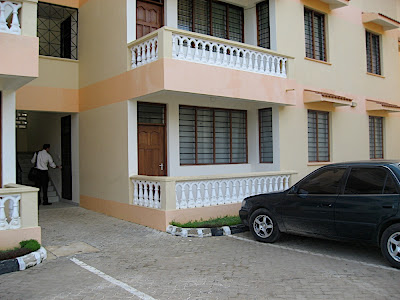
Here is gate #1. It is manned at all times. Behind the gate, you can see your friendly neighborhood mosque. This is the one that has been so kind as to remind us five times each day when it’s time to pray. So far, they haven’t missed one yet (although I confess that half the time I sleep through the first daily reminder).

And up ahead is gate #2.

I hope you’ve enjoyed your stay. If you want to come visit, you can sleep on the little wicker couch in the front room.
This is where I sleep (complete with mosquito net), although the mattress situation has changed. Now I actually have a mattress that is too big for the bed, so it hangs off the edges and is bowed in the middle. Aaron calls it the soft taco. I’ve actually decided this is the most comfortable mattress in the house.
Here’s the front room/living/dining area…
The kitchen, complete with propane-powered hot plate and water cooler. Fortunately, we upgraded to a refrigerator that is slightly better-equipped to handle the high volume of traffic created by five people. Maybe only slightly. But I’m grateful to Louis for the upgrade.
And here is my shower. Speaking of coming clean - do you see the water running there, in the bottom right corner of this picture? No? Let me give you a closer look…
How about now?
This is how I’ve taken my shower for the last few days, by contorting myself under that little trickle in the cold water tap that I think is meant for washing one’s feet. Since I came here two weeks ago, our water has shut off twice, and for the last three days we’ve almost completely lost all water pressure, to the point that only the faucets close to the ground still produce water. We actually have a hot water switch we can flip on, but I’ve decided it must just be for show.
Now, I don’t mind at all that my showers here are cold. I actually kind of prefer it, especially after my morning runs to the beach. And I am very happy to have access to clean, running water. I actually feel a little bad complaining about such nuances even in jest, after seeing the water that village women have access to. With that perspective in mind, I’ll just chalk this up to being part of my African adventures. Anyway, on with the tour.
Let’s step outside. This is my flat – the one on the bottom corner. Most of our complex is actually empty, but the residents we have met are very nice. Aaron is locking the door, because he’s the only one strong enough to make the key turn.
Here is gate #1. It is manned at all times. Behind the gate, you can see your friendly neighborhood mosque. This is the one that has been so kind as to remind us five times each day when it’s time to pray. So far, they haven’t missed one yet (although I confess that half the time I sleep through the first daily reminder).
And up ahead is gate #2.
I hope you’ve enjoyed your stay. If you want to come visit, you can sleep on the little wicker couch in the front room.
Tuesday, June 02, 2009
Mwambalazi and more
I doubt every week will be as packed as this one was (but then, I’m hoping it is). I’ll try to keep up.
We’ve had some more people moving in and out of our house, which makes it feel a lot like a halfway house. Three Coast Coconut boys have been passing through, and soon we’ll get one more intern from DC and one from Miami. Another girl is out here who works for CHOICE Humanitarian (she does grassroots technology, which she has dubbed as “grassnology”). All staying at our place. After the dust settles, there will be six of us. It’ll be tight, but I think we can do it.
I’m sharing a room for the first time since college, but I really like the girl I’m rooming with (the grassnologist). Her name is Bekah, she’s a free spirit from a small town in Utah (population 300) and she’s had such an interesting life. We seem to enjoy very similar things. She’s been out here for two months already, so she knows the area and said she’d show me around. I have a great time talking with her and she's willing to go running with me. It is a blessing to have her in the house.
That reminds me – I haven’t yet shown you what my house is like! Here it is:
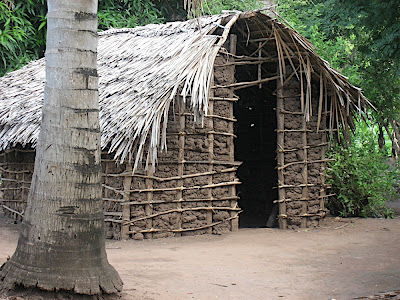
Home sweet home.
Kenya’s Independence Day was on June 1, which meant we all got a 3-day weekend. We took advantage and headed south. We got to visit Coast Coconut Farms and see the process of making coconut oil.
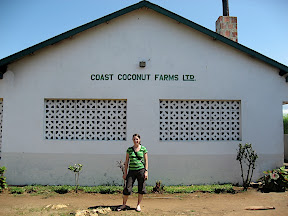
It was interesting! They husk the coconut…
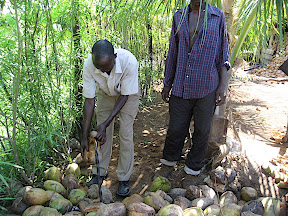
Crack it open and shred all the meat out…
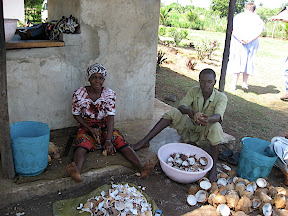
Then you dry out the meat and press out all the oil. I promised mom I'd bring some home to her, but apparently it solidifies at 78 degrees Farenheit. That's not a problem, is it?
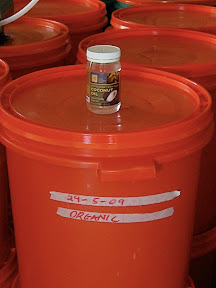
They even use the old shells to make charcoal. How many of you knew that coconut shell charcoal was a valuable commodity? (This is Luis Pope, one of the founders of Yehu. I can’t say enough good things about him. He is such a generous man, beloved by many people in the Mombasa area. He’s taken over 20 trips to Kenya over the last 10 years.)
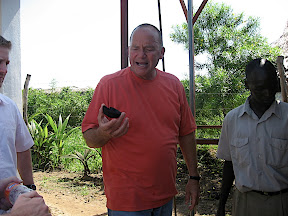
We also visited Mwambalazi, Yehu’s first branch (there are now six). My first trip into the bush. It was enlightening! I got to see women everywhere wearing the traditional attire you’d expect to see in the African bush, and it was also quite common to see them carrying packages of all shapes and sizes on their head. I didn’t actually get a pic of that yet. But give me some time, I’ll get it. They're beautiful. Kenyans are beautiful!

Some more sights from the bush…this is Mwambalazi's well. They use this water for drinking, cooking, and bathing.

This is the gathering place for the Mwambalazi branch meetings, and this guy is the groundskeeper. He was sweeping the dirt to keep things neat and tidy.
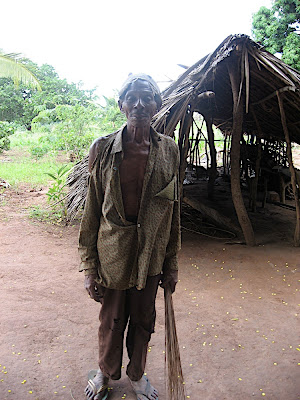
We visited one family and got to meet the three wives and all of their darling children.
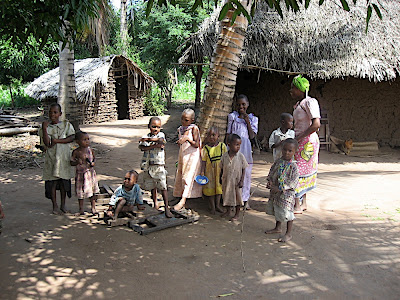
They weren’t afraid of us, for the most part…probably because of all the Yehu people who come to the village.
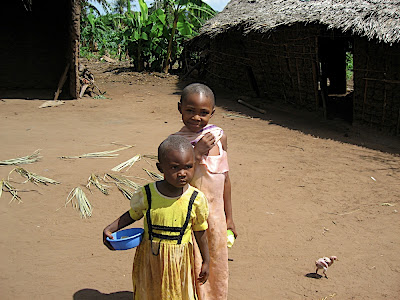
I just kept taking pictures of the kids and showing them. It was a big hit!

Imagine this, all you parents/aunts/uncles out there – kids here don’t even know what to do when a camera is pointed at them. Smiling at the camera is not a process they’ve been conditioned to do, so they just stare at the strange silver box you point at them. I am very proud of this picture. I think it’s my favorite so far. What do you see in these beautiful little brown eyes?
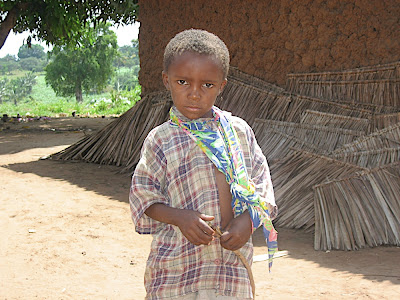
I’ve noticed a little trend – kids out here aren’t used to seeing white people, and I think it scares them a little. Kind of like this little guy…

I saw this phenomenon play out at church – most of the kids just looked at us in fear. It’s a good thing I’m so determined to get on their good side.
Luis Pope is building a home outside of Mombasa because he is planning to spend a greater amount of time here once he retires. We stopped by the construction site and enjoyed his backyard…Diani Beach. My first chance to dip my toes in the Indian Ocean.
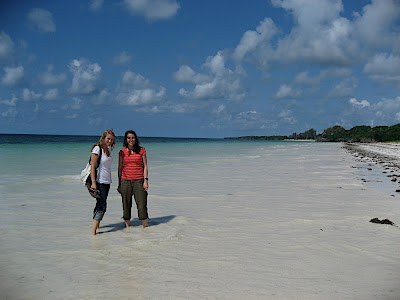
We made a few friends while we were there.

We also visited Shimoni and Washimi Island.
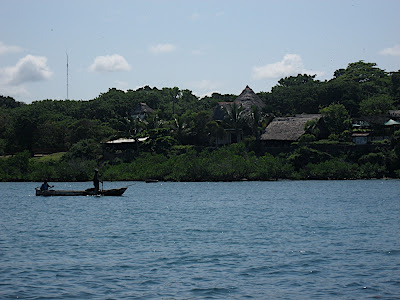
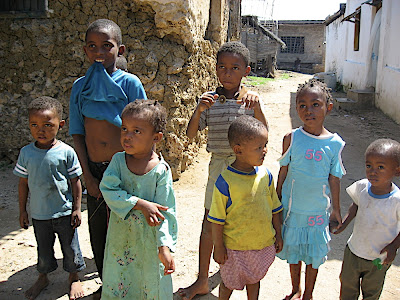
In Shimoni we found the Slave Caves, where people were kept prisoner before they were carted off to the markets of Zanzibar.
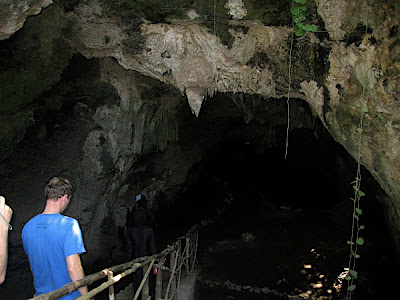
It was a sombering visit. The caves had such a thick, dark sense of foreboding and gloominess. You could see the places in the wall where people had been chained up.
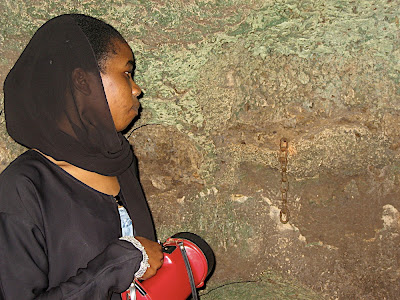
To add to the mood, when we went deeper into the cave we found that it was also heavily inhabited by bats. Can you imagine what it must have been like, and that people actually did this to other people? It's such a scar on the history of man.

Church on Sunday was at the Changamwa branch. Wonderful people. And I just love how the church is always the same, wherever you go – the lessons, the doctrine, the Spirit…it’s my comfort blanket out here. But I just have to mention one comment that was made. We were talking about teaching children the value of hard work, and someone said, “Yeah, nowadays kids don’t even know how to carry water on their head!” Love it.
I went running this morning with Bekah, to see how close we live to the beach. It was glorious. We got there just in time to see the sun come up over the ocean. A-MAY-ZA-ZING. The beach here is so beautiful. The sand is white and very fine, the ocean is a beautiful turquoise blue, and there were clouds in just the right place in the sky to make for a deliciously captivating sunrise that I couldn't take my eyes off of. Maybe next time I'll bring my camera.
We’ve had some more people moving in and out of our house, which makes it feel a lot like a halfway house. Three Coast Coconut boys have been passing through, and soon we’ll get one more intern from DC and one from Miami. Another girl is out here who works for CHOICE Humanitarian (she does grassroots technology, which she has dubbed as “grassnology”). All staying at our place. After the dust settles, there will be six of us. It’ll be tight, but I think we can do it.
I’m sharing a room for the first time since college, but I really like the girl I’m rooming with (the grassnologist). Her name is Bekah, she’s a free spirit from a small town in Utah (population 300) and she’s had such an interesting life. We seem to enjoy very similar things. She’s been out here for two months already, so she knows the area and said she’d show me around. I have a great time talking with her and she's willing to go running with me. It is a blessing to have her in the house.
That reminds me – I haven’t yet shown you what my house is like! Here it is:
Home sweet home.
Kenya’s Independence Day was on June 1, which meant we all got a 3-day weekend. We took advantage and headed south. We got to visit Coast Coconut Farms and see the process of making coconut oil.
It was interesting! They husk the coconut…
Crack it open and shred all the meat out…
Then you dry out the meat and press out all the oil. I promised mom I'd bring some home to her, but apparently it solidifies at 78 degrees Farenheit. That's not a problem, is it?
They even use the old shells to make charcoal. How many of you knew that coconut shell charcoal was a valuable commodity? (This is Luis Pope, one of the founders of Yehu. I can’t say enough good things about him. He is such a generous man, beloved by many people in the Mombasa area. He’s taken over 20 trips to Kenya over the last 10 years.)
We also visited Mwambalazi, Yehu’s first branch (there are now six). My first trip into the bush. It was enlightening! I got to see women everywhere wearing the traditional attire you’d expect to see in the African bush, and it was also quite common to see them carrying packages of all shapes and sizes on their head. I didn’t actually get a pic of that yet. But give me some time, I’ll get it. They're beautiful. Kenyans are beautiful!
Some more sights from the bush…this is Mwambalazi's well. They use this water for drinking, cooking, and bathing.
This is the gathering place for the Mwambalazi branch meetings, and this guy is the groundskeeper. He was sweeping the dirt to keep things neat and tidy.
We visited one family and got to meet the three wives and all of their darling children.
They weren’t afraid of us, for the most part…probably because of all the Yehu people who come to the village.
I just kept taking pictures of the kids and showing them. It was a big hit!
Imagine this, all you parents/aunts/uncles out there – kids here don’t even know what to do when a camera is pointed at them. Smiling at the camera is not a process they’ve been conditioned to do, so they just stare at the strange silver box you point at them. I am very proud of this picture. I think it’s my favorite so far. What do you see in these beautiful little brown eyes?
I’ve noticed a little trend – kids out here aren’t used to seeing white people, and I think it scares them a little. Kind of like this little guy…
I saw this phenomenon play out at church – most of the kids just looked at us in fear. It’s a good thing I’m so determined to get on their good side.
Luis Pope is building a home outside of Mombasa because he is planning to spend a greater amount of time here once he retires. We stopped by the construction site and enjoyed his backyard…Diani Beach. My first chance to dip my toes in the Indian Ocean.
We made a few friends while we were there.
We also visited Shimoni and Washimi Island.
In Shimoni we found the Slave Caves, where people were kept prisoner before they were carted off to the markets of Zanzibar.
It was a sombering visit. The caves had such a thick, dark sense of foreboding and gloominess. You could see the places in the wall where people had been chained up.
To add to the mood, when we went deeper into the cave we found that it was also heavily inhabited by bats. Can you imagine what it must have been like, and that people actually did this to other people? It's such a scar on the history of man.
Church on Sunday was at the Changamwa branch. Wonderful people. And I just love how the church is always the same, wherever you go – the lessons, the doctrine, the Spirit…it’s my comfort blanket out here. But I just have to mention one comment that was made. We were talking about teaching children the value of hard work, and someone said, “Yeah, nowadays kids don’t even know how to carry water on their head!” Love it.
I went running this morning with Bekah, to see how close we live to the beach. It was glorious. We got there just in time to see the sun come up over the ocean. A-MAY-ZA-ZING. The beach here is so beautiful. The sand is white and very fine, the ocean is a beautiful turquoise blue, and there were clouds in just the right place in the sky to make for a deliciously captivating sunrise that I couldn't take my eyes off of. Maybe next time I'll bring my camera.
After that, we turned around and booked it home, to beat the heat that most definitely would accompany the rising of the sun. What a great way to start the work week.
Subscribe to:
Comments (Atom)

